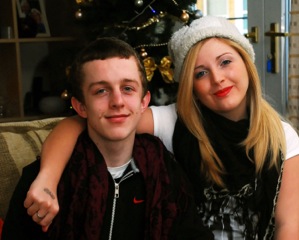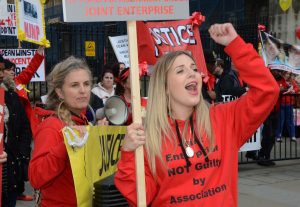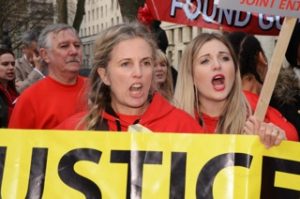By Charlotte Henry
A follow on from: My son – disregarded by society.

Charlotte and her brother Alex
I have always been protective over my brother – throughout my parent’s turbulent relationship we sought solace from one another and throughout the years of bullying he endured I sought to protect him, often turning up unexpected when my high school broke up early to confront his bullies in the school yard. Following his conviction, I was powerless to protect him and was tormented to the brink of insanity. I knew we had to change the law, but I just didn’t know how.
Joint Enterprise
The law of joint enterprise as it stood at the time, was that to be convicted of murder as a principal offender (the one who dealt the fatal blow), the prosecution must prove that he intended to kill or commit at least very serious harm. However, for the secondary offender (the one who did strike the fatal blow or even necessarily physically or verbally assist or encourage the killing), would only need to foresee the possibility that another person would kill or commit at least very serious harm. It was this lack of intent which created the anomaly where it was easier to convict a secondary offender than the principal who actually struck the blow, wielded the knife, or pulled the trigger. This lesser culpability coupled with the fact that secondary offenders receive the same sentence as their principal counterparts, for us was an injustice worth fighting against.
Our Campaign

Charlotte (front) and her mum Sally protest with JENGbA outside the Royal Courts of Justice
Alongside other families from the campaign Joint Enterprise Not Guilty by Association (JENGbA) we began our fight against joint enterprise, appearing on television, radio and in print – we told Alex’s story far and wide in the hope of raising public awareness and ultimately achieving law reform. It was an article about Alex in Daily Mail’s You Magazine https://www.dailymail.co.uk/home/you/article-2743794/My-brother-not-murderer-How-one-woman-gave-fight-justice.html which unexpectedly resulted in something we had long resigned to the past – a diagnosis for Alex. The article described Alex’s emotional fragility, anxiety and depression, inability to cope with breaks in routine and excellent abilities in mathematics and chess. A reader then emailed us through Alex’s website (www.justiceforalexhenry.co.uk) and asked us if we had ever had Alex screened for autism. I showed my mother the email and we spent the following days avidly researching autism. We were astounded by the similarities – Alex could be autistic!
From that moment mum worked tirelessly to obtain an assessment. All the rejection and trauma suffered at the hands of hapless government bodies made her determined to obtain a private assessment for Alex – which was not an easy feat. After several rejections, it was ultimately the kindness and compassion of Professor Baron-Cohen who assessed Alex pro bono.
I’ll never forget the day we received the diagnosis. I felt sick and the world blurred, as mum with her phone shaking in her hand, read the email aloud. ‘Alex is autistic’ she read as the world span back sharply into focus – we had done it, finally we had an answer.
The Professor’s report described Alex as a very vulnerable young man who finds it hard conforming to social norms, planning, making good decisions, reading cues and understanding social situations – all of which can get him into trouble. He cannot easily interpret or predict the intentions of others in real time, particularly in fast-moving, spontaneous situations.
But this was only half the battle won, and wiping away the tears we set about a new task – showing the Court that with the theory of mind difficulties Alex suffers from, he could not have understood Ferguson’s intentions, he could not have predicted his behaviour and therefore he could not have foreseen the use of the knife – he was not guilty.
 The leave to appeal against conviction was heard on the 14th and 15th June 2018, with the eminent Professor Baron-Cohen giving evidence for Alex’s defence. Fresh evidence, to be adduced on appeal must be fresh as in ‘reasonably not discoverable at trial’ and it must be capable of belief and relevant. It was the evidence of Baron-Cohen that since autism is an invisible disorder it is often overlooked my professionals and therefore was not necessarily discoverable at trial. It was capable of belief as Baron-Cohen, leading expert in the field was certain Alex was autistic. It was entirely relevant as it is very unlikely that Alex could have understood the intentions and motivations of Ferguson and therefore would not have foreseen the use of the knife and therefore is very unlikely to be guilty of the offence. The Crown on the other hand submitted that the diagnosis was not fresh as Alex’s legal team should have had Alex assessed prior to trial and it was also not capable of belief as my mother’s PhD in Psychology would have enabled her to ‘coach’ Alex in how to act autistic and because, in the prosecutors view, autistic people can’t laugh and Alex laughed with a co-defendant during a break in the proceedings.
The leave to appeal against conviction was heard on the 14th and 15th June 2018, with the eminent Professor Baron-Cohen giving evidence for Alex’s defence. Fresh evidence, to be adduced on appeal must be fresh as in ‘reasonably not discoverable at trial’ and it must be capable of belief and relevant. It was the evidence of Baron-Cohen that since autism is an invisible disorder it is often overlooked my professionals and therefore was not necessarily discoverable at trial. It was capable of belief as Baron-Cohen, leading expert in the field was certain Alex was autistic. It was entirely relevant as it is very unlikely that Alex could have understood the intentions and motivations of Ferguson and therefore would not have foreseen the use of the knife and therefore is very unlikely to be guilty of the offence. The Crown on the other hand submitted that the diagnosis was not fresh as Alex’s legal team should have had Alex assessed prior to trial and it was also not capable of belief as my mother’s PhD in Psychology would have enabled her to ‘coach’ Alex in how to act autistic and because, in the prosecutors view, autistic people can’t laugh and Alex laughed with a co-defendant during a break in the proceedings.
On 11th August 2018 Alex’s permission to appeal was refused. Lord Thomas, Lady Hallet and Lord Goss agreed with the Crown, they knew more than Baron-Cohen in the field of autism – ‘At worst Henry suffered from mild mental illness’ [Grant Murray and others [2017] EWCA Crim 1228 para 71.